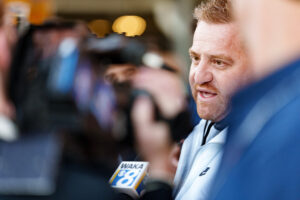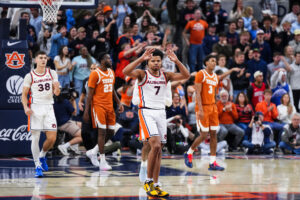Former college football coach and ESPN announcer Mike Gottfried has found a new arena, helping to plug up the heart hole for thousands of fatherless young men
In 1989, the phone rang at the Pitt football office.
A young Pittsburgher was inquiring about a job, and the secretary put him through to Head Coach Mike Gottfried. After a few minutes into a gauzy, unremarkable pitch, the aspiring coach said something Gottfried would never forget.
“What are you doing now, son?” Gottfried asked.
“Well, right now, I’m working on the Pennsylvania Turnpike.”
“I wish I could help you, but we don’t have a job right now,” Gottfried said. “But…send me your resume and we’ll keep it on file.”
The next day when Gottfried arrived at the office, his secretary informed him that the same young man was waiting for him.
“I said send your resume, not bring it by,” Gottfried told him. But the young man’s persistence made such an impression on the coach that when a coaching position came open at Pitt, Gottfried hired him.
That man’s name is Mike McCarthy, head football coach of the Green Bay Packers.
Almost thirty years later, Mike Gottfried sits in his war room at the Team Focus office in Mobile, Alabama, answering an array of cell phone calls and meeting with glowing staffers who pepper him with varying requests. Though his trademarked, Caesar-like hair is graying and his speech is compromised from what one doctor believed was a mild stroke, it seems as though nothing can slow the 71-year-old down. He dresses for a workout. Today, he’s wrestled into a lime Under Armor pullover, gym pants, and black, thick-soled tennis shoes. He shuffles around the office like a bee visiting several garden flowers, pulling t-shirts, books, and pamphlets out of boxes and tossing them to guests. Extra large? Large? Behind him, the Team Focus game plan is inscribed in red EXPO marker on two massive whiteboards the size of a Mazda. Four deflated, half-white footballs, still in their plastic bags, sit on a long table like caught trout, and there are cardboard boxes with unnamed contents choking the ceiling.

A self-described “connector,” Mike invests much of his day introducing people, stuffing a cell phone into various ears and saying, “here, talk to this person.” Mike casts a wide net of influence and his interests are far ranging, from boys who need a father figure to a budding project for Israel. Southern life has yet to blot out his native Ohioan dialect, which rises to a euphoric, kidlike falsetto at punch lines of stories.
Team Focus is the culmination of Mike’s lifelong struggle to heal from the untimely death of his father. It’s his “More Than Conquerors” effort strung together like a long, continuous vigil. The goal of the organization is to provide a comprehensive mentoring program for young boys, ages 10-18, who find themselves in unfortunate circumstances with no father present in their life. The tagline is “Guiding Young Men to the Ultimate Victory” and the labor is unashamedly Christian, centering on Jeremiah 29:11: “For I know the plans I have for you,” declares the Lord. “Plans to prosper you and not to harm you, plans to give you hope and a future.”
For Mike, the crucible began on April 3, 1956.
Fritz Gottfried was a railroad engineer in the small Midwest town of Crestline, Ohio. An old photograph displays a man with deep-set eyes and tight coils of brown hair lapping against the top of his forehead. His wife and three sons squint at the camera, but Fritz seems disaffected by the sun. His middle boy, Mike, holds a toy six shooter in his hand.
Fritz worked hard on the railroad and often came home late at night. “Just lay here with me ‘til I fall asleep,” a rail-fatigued Fritz would often ask Mike. Fritz was interested in the boys’ athletic pursuits and, as Mike described it, was the “family coach”—teaching them baseball, basketball, football, and bowling. It was apparent to all who lived in Crestline that Fritz loved his family dearly.
But in the wee hours of April 3, Fritz complained to his wife that he wasn’t feeling well. He crawled out of bed and started down the hall. Mike was in the next room and, oddly, hadn’t gotten a wink of sleep, even though it was 3:30 in the morning. Then the eleven-year-old heard the most horrifying sound of his life—the loud thump of his father’s body against the bathroom floor.
The whole family snapped to Fritz’s aid. Mike’s mother instructed the eldest boy Joe to get the doctor, who was five houses away. Mike retrieved a washcloth, wetted it and placed it on his father’s forehead. Then he climbed into the floor, holding his father’s head in his hands and praying for God to save him. Fritz was moaning with agony as the youngest, Johnny, stood at the doorway, too young to comprehend, eyes agape, looking at Mike and his dying father incredulously.
Fritz Gottfried was but 41 when he died in that Ohio home on April 3, 1956.
Mike’s world was rocked, and he spent the next few months trying to comprehend the twist of this cruel poetry.
“Why now?” Mike often asked the heavens.
But no answer came.
When the Gottfrieds were forced to relocate, Mike’s mother soon sent him to live with distant family, the patriarch of which was a very serious man by the name of Bill Harbaugh. Young Mike viewed the elder Bill as a strict disciplinarian, and Bill didn’t disappoint. “Mike, eat everything on the plate,” Harbaugh instructed at the dinner table. “And you’ll drink no liquids.” (Harbaughology suggested that drinking liquids during a meal might stunt the growth of a young athlete, who needed to pack in as much food as possible.) However unorthodox the method, Mike insists that his six months at the Harbaughs was just what he needed.

A local nun, who intimated to the moving-wayward boy that his ship was getting off course, instilled further discipline in Mike’s life. She shared with him the famous verse from the Book of Jeremiah, one that Mike now says is something you hold onto when things are looking bleak.
Mike soon turned to sports as an outlet to cope with the loss of Fritz. Crestline was a Cleveland Indians town. This was around the time of slugger Rocky Colavito and fireballer Bob Feller. Mike remembers applying for a batboy job with the Indians and boarding a train to Cleveland (our parents let us go!) with several of his friends while the Yankees were in town. “I remember we went to the hotel where the Yankees were staying,” Mike recalls. “We kept calling up to the rooms, trying to get ahold of Moose Skowron.”
Back at home, a towering local figure left a more indelible impression on Mike than any of the men in pinstripes. Merle “Coach” Hutson was the Driver’s Ed teacher and swimming coach at Crestline High School. The town dandy, Hudson attracted you with his soft panache and gentlemanly example: doting on his wife, speaking to everyone on the street, and attending church every Sunday.
“I wanted to be like him,” Mike says. “We revered him.”
In Hutson, Mike saw a target life, and made mental notes to that fact.
High school football in Ohio was a big deal, and for nearly a decade, the Harbaugh boys had dominated the quarterback spot at CHS. Brothers Jack and Jerry, and cousin Joe, were the quarterbacks in respective order, and it seemed a mere formality that Mike would follow suit. But his junior year, Mike got beat out for the position by a boy named Ray Pry, and the chain of family at the quarterback position was unhinged. Mike would eventually start and received his lone scholarship offer to Morehead State in Kentucky.
His freshman year at Morehead State, Mike guided the Eagles to a conference co-championship by throwing two touchdown passes in the final game against Eastern Kentucky. But it was a game in his senior year that he would never forget—and one that would put him in the record books.
Against Western Kentucky, Mike’s errant throws led to four interceptions in the first half. Each time, he came off the field to a colder sideline.
“Nobody would talk to me,” Mike said.
The team walked into the locker room down only 3-0, despite the mishaps. But the silence continued.
“At halftime, nobody would come around me,” Mike laughs.
In the second half, Mike threw his fifth and sixth interceptions in short order. This time, as he came to the sideline, taking his helmet off, Coach Earl Bentley grabbed a fistful of shoulderpad.
“Coach, take me out,” Mike said somberly. “I don’t have it today.”
Bentley squinted his eyes at his deflated QB and quipped, “Mike, if we had anybody else, you’d been gone a long time ago!”
Mike went back into the game and promptly threw his seventh interception, setting an NCAA record for most interceptions in a game.
After graduation from Morehead State, Mike coached high school at Roseville High School and later St. Paul High School, accumulating a 50-19-1 record across five years. In 1975, he was hired as the associate head coach at the University of Cincinnati under Tony Mason. It was during this time that the “Big Red Machine” was blistering its way to a World Series championship with the likes of Pete Rose, Tony Perez, Johnny Bench, and Joe Morgan. While in Cincy, Gottfried met Rose and the two men hit it off immediately. Since then, the pair has maintained a forty-year friendship.
After a short stint at the University of Arizona, Mike got his first head coaching job at Murray State University in Kentucky. He spent three seasons with the Racers before taking the head coaching position at Cincinnati in 1981.
And on October 23, 1982, Gottfried saw God.
That day, the Cincinnati Bearcats were pitted against the Alabama Crimson Tide at Legion Field in Birmingham. Before the game, the team manager, affectionately known as “Speck,” alerted Gottfried in the bowels of Legion Field that “Bear Bryant is looking for you.” Dr. Smith, a mentor to Mike since his Morehead days, happened to be smoking a cigarette nearby when he heard this exchange. Looking up from a tug he jibed, “Time for you to go take your medicine.”
Although Mike’s Cincinnati squad lost that day, 21-3, Mike gained a fond memory: coaching against Bear Bryant in his last season at Alabama (Bryant would coach only five more games in his career).
So what was it like for a young coach to look across the field at immortality in the flesh?
“I was thinkin’, ‘I wonder what he’s thinkin!’” Mike says. “But no, Bear Bryant was great.”
Gottfried later coached at Kansas for three seasons (’83-’85) and the University of Pittsburgh for four seasons (’86-’89). And because most young people remember Mike Gottfried for his stint with ESPN as a broadcaster for college football games, many have forgotten how successful he was as a football coach. During his tenures at Kansas and Pitt, Mike defeated teams led by Barry Switzer, Lou Holtz, and Joe Paterno. Many of Mike’s assistants went on to have successful careers in their own right, including John Fox, Mike McCarthy, Ron Zook, Frank Beamer, John Harbaugh, Paul Hackett and Mike Solari. In addition, thirty-five of Mike’s former players moved on to the NFL, including Craig “Iron Head” Heyward. Gottfried also had the opportunity to work alongside several coaching greats, including John Calipari, who was an assistant coach at Kansas (’82-’85) and Pitt (’85-’88), and Larry Brown, who was the head coach at Kansas from 1983-88.
While at Kansas, Mike received an epiphany of sorts before the Oklahoma game in 1984. “I had a dream we were going to win the game,” he said. “I saw everything, how to do it.”
That week, Mike crossed Larry Brown in the hallway.
“What do you think?” Brown inquired.
“I think we are going to beat Oklahoma.”
Later in a staff meeting, Mike looked his coaches in the eye and said, “If you don’t believe we are going to win this game, you don’t need to be here.”
No one left, and Kansas won 28-11.
Although Mike’s Pitt teams stole victories in two of the most storied environments in all of college football (Notre Dame on October 11, 1986 in Notre Dame Stadium, and Penn State on November 12, 1988 in Happy Valley), perhaps his most memorable game was the 1989 edition of the artic-hearted “Backyard Brawl” versus West Virginia in Morgantown. Both teams were coming in undefeated, with Pitt ranked #10 in the country and WVU perched at #9. By halftime, Pitt was getting throttled and Gottfried was tasked with addressing his beleaguered team in the locker room.
“If they can score 100, they’ll score 100,” Gottfried suggested. “We need to relax. Loosen up.”
Quarterback Alex Van Pelt had been particularly anemic, throwing several first half interceptions. After another interception in the second half, Van Pelt came back over to the sideline, expecting ire from his head coach. But instead of chewing on his quarterback, Mike remembered a lesson he’d learned from a speaker named Tom Arington while at a conference in Cincinnati. “Some days you win, some days you learn,” Mike told Van Pelt.
Then an old memory came flooding back. “Alex, I want you to stay in,” Mike said to his morose quarterback, pulling him back. “Because back in 1965 I threw a record seven interceptions and I want you to break my record.”
“He looked at me like I had two heads!” Mike laughs, his voice rising to a Barry Gibb altitude.
Although WVU led 31-9 at the end of the third quarter, the levity seemed to steel Van Pelt, as the Panthers furiously charged back to earn a 31-31 tie on a last second, 42-yard field goal (worthy of a New York Times write up).
Concluding a 7-3-1 regular season campaign, the Panthers and Gottfried seemed poised to make a run at the Miamis and the Florida States of the world by 1990. But Gottfried had gotten into an imbroglio with the Pitt administration, and by the December 2 contest against Rutgers in Dublin, Ireland, it was clear that Gottfried would be ousted. “I challenged authority,” Mike says. “They wanted to raise the academic standards and the president got tired of me. I should have gotten fired.”
Gottfried was dismissed on Thursday, December 14 and was replaced by assistant Hackett, who would later become the head coach at USC. Now battling a new narrative that he didn’t cotton to academia, Mike found it difficult to get another coaching job, though Kentucky, LSU, South Carolina, UAB, and Louisville all flirted with the idea. The truth was that Mike wasn’t anti-academics; he simply didn’t want the standards to be so high that he would not be able to compete on the football field.
Mike prayed that God would give him the desires of his heart, and suggested that the desire of his heart was to remain a coach.
“Lord, open the door, or close it,” Mike prayed.
Little did he know that the Lord was doing a new thing.
Though Mike’s only experience in front of a TV was his regular appearance on The Mike Gottfried Show while at Pitt, ESPN needed a game analyst and soon came a-calling. Mike signed a five-game contract, but quietly planned to get back into coaching after the 1990 season. Because Mike’s new job with ESPN allowed him considerable flexibility, he chose to move his family to Mobile, AL.
In his first game, Mike, getting his bearings, had trouble navigating his earpiece when the producers instructed him on what to say. “After the first touchdown, the producer says in my earpiece, ‘Tell the country why that play worked.’ I said, ‘OK.’ He said: ‘You just said ‘OK’ to 6 million people. You can’t do that.’ I said, ‘All right,’” Gottfried once told The Cincinnati Enquirer.
After those initial gaffes, Mike settled down to become one of the best color commentators in the game. At the time, ESPN was competing with the big three—CBS, ABC, NBC—and was “known but wasn’t as respected” as Mike says. Over time, Mike noticed that ESPN was climbing the mountain to gain equal footing with the big boys. Mike Gottfried’s analysis was a large part of that success.

Mike says that calling the games and traveling from town to town was nice, but the camaraderie was the thing Mike liked best about broadcasting. Working with men like Mike Patrick, Sean McDonough, and Ron Franklin made sportscasting a fun affair. “It was not a job to me,” Mike says. “I loved the guys at ESPN.”
One story exemplifies the type brotherhood these men enjoyed. It was common knowledge inside ESPN circles that Mike enjoyed breakfasting on pancakes and a grilled cheese sandwich (on whole wheat bread) while on the road. During one particular road trip to Tallahassee, Florida for an ACC contest, Mike was awoken in his hotel room at 5:30 a.m. by room service.
Room service? Mike grumbled to himself. I didn’t order room service.
Nevertheless, Mike was happy to receive his pancakes and grilled cheese sandwich (on whole wheat bread).
Several minutes later, the doorbell rang again. “Sir, we have your order.”
Pancakes and grilled cheese sandwich.
Now wait.
Several minutes later, it happened again. By the third order, Mike had enough food for the entire staff. Later on, Mike discovered that the triumvirate of Mike Patrick, Mike Tirico, and Jerry Punch had pulled the clever prank.
But it wasn’t all fun for Mike Gottfried at ESPN. Starting in 2006, Mike discovered that he was having problems with his speech. “We were in Reno, Nevada, and I could not get the word out,” Mike remembers. “When I got back home, I said to my wife, ‘My speech—something’s wrong.”
Fans noticed it, too. Message boards were flooded with questions: Does Gottfried drink? Is something wrong with him? Does he have Parkinson’s?
So Mike called the family doctor and told him that he was concerned about his job. After a few tests, the doctor informed Mike that he had ALS, also known as Lou Gehrig’s disease. “I don’t have ALS,” Mike retorted. “Don’t say that.”
Mike soon went for second and third opinions. One doctor diagnosed Parkinson’s—yet another diagnosis with which Mike disagreed. “I told him, ‘I don’t have Parkinson’s,” Mike said, holding his hands out as steady as a bridge.
A third opinion suggested he’d had a mild stroke. But the verdict was clear: Mike’s time at ESPN was limited.
It was a slow ride into the sunset for Mike. The network eventually took him off of the Saturday game and repositioned him to ESPN2. In 2012, Mike retired from broadcasting, and was able to concentrate on his ministry full-time.

In 2000, Mike’s wife Mickey suggested that they take some underprivileged boys out to eat. “No,” Mike said. “I want to spend time with my own children.”
But Mickey was unrelenting. Soon Mike realized that this could be the beginning of a ministry—something that could be truly extraordinary and have a lasting impact on young men in this coastal Alabama town. Besides, Mike needed something to reinvigorate his zest for life. He was getting restless. He admitted he felt “put out to pasture.”
Enter Team Focus.
Mike and Mickey eventually did pick up a few boys—sixty of them, to be exact—by inviting them to a camp called “Camp Focus” that was funded by proceeds from the GMAC Bowl. Campers were taught to say, “yes ma’am” and “no ma’am,” to balance a checkbook; they were taught how to tie a tie, eat at a nice restaurant, and ask a girl out on a date. Hooks were plunged into ponds and prayers were said over these young men—things that, Mike believes, fathers should be teaching their children.

As the program progressed, Mike and others surmised that it was possible, not to replace, but to “fill the gap” left by a father’s absence or indifference. Mike also hoped that manhood might grow out of this brokenness.
“True manhood is serving people, honoring people, and loving people,” Mike says. “Being a good Christian, following the Bible, and walking in the destiny that God gave you.”
God took Mike out of the coaching arena, molded and prepared him through broadcasting, and slowly unfurled His mysterious, divine plan for his life over a number of wilderness years. Then God affirmed Mike by giving him a much bigger arena, one whose rim does not encompass the mere length and breadth of a football field, but rather one that circumnavigates the country. Team Focus now serves over 1,000 at-risk youth from satellite offices in Austin, Mobile, Jacksonville, Las Vegas, Lexington, South Florida, and Ohio.

“Since 2000, Team Focus has served over 4,000 young men without father,” Mickey says. “They are at-risk because they do not have a father, but not ‘at-risk’ in every sense of the word. We accept young men without fathers and raise up leaders.”
Empathizing with these young men who have a hole the size of a father’s love in their heart, Mike literally pours his life into each one of their lives. He knows their names; they have his cell phone.
Through this ministry, God gave Mike the desires of his heart. It just took him a long time to understand what those desires were. Those thousand boys might not have a father, but Mike Gottfried is the next best thing.
There’s an old saying that goes, “It is doubtful whether God can use a man greatly, until first He wounds him deeply.”
Perhaps the answer to “Why Now?” is that Mike understands perfectly how an eleven-year-old feels without a father. Perhaps Mike knows best the patina of ache from a fatherless household.
“I still mourn for my father,” Mike says. “But I think I’ve healed.”
Through it all, Mike Gottfried has learned the biggest lesson about healing:
Love is the best remedy for wounds. Talegate
Mike Gottfried has authored three books: Coach’s Challenge, Wisdom from Winners, and Friend of the Court. He also helped to found the GMAC Bowl. To support Mike and his ministry, please visit www.teamfocususa.org.
*Coach John Calipari hosts the Team Focus camps in Kentucky, while Nick Saban, Urban Meyer, and Mark Gottfried are yearly speakers.
Cover Photo by Al Blanton
All Team Focus photos courtesy of Team Focus








